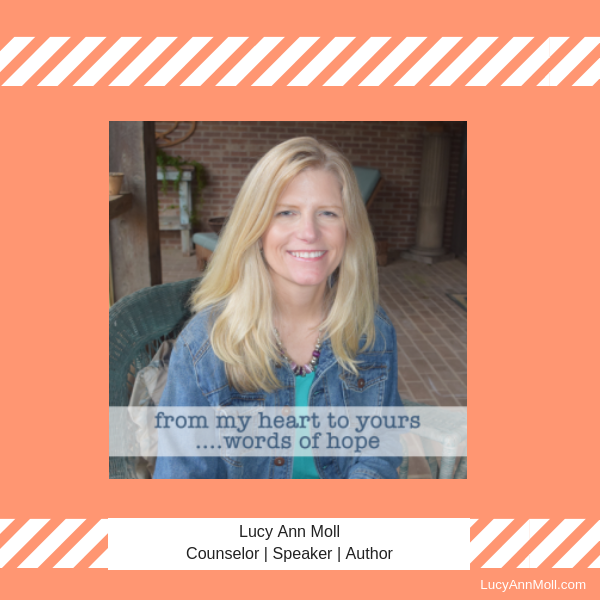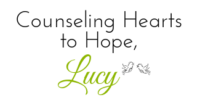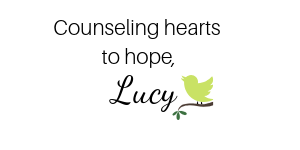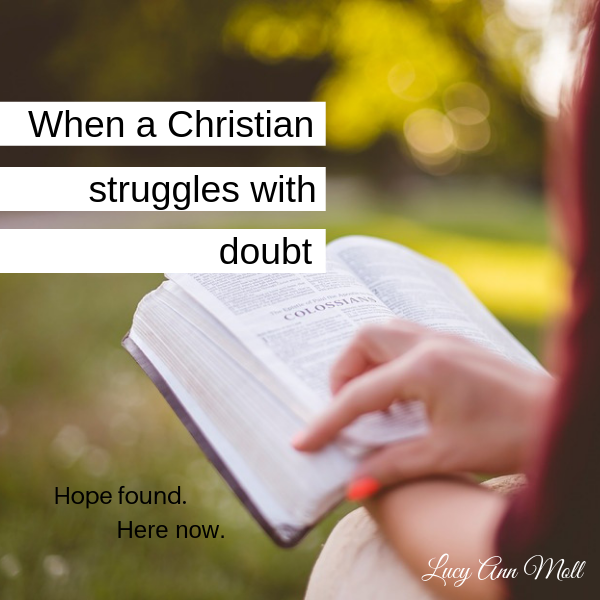
by Lucy | Aug 6, 2019 | biblical counseling, relationships |
My in-laws are in their 80s and slowing down, but don’t have dementia. Maybe they’ll develop this memory cognitive disorder. Maybe they won’t.
But I have had the opportunity of counseling folks whose loved ones have these life-stealing, memory-dimming cognitive disorder. And the church needs to be ready.
Click & Tweet!
Yesterday. My article appeared first here at The Biblical Counseling Coalition and is used with permission.
How is your church helping the caregivers of dementia sufferers?

When you hear the word dementia, what first pops into your mind? Old age? Alzheimer’s? Nursing homes? The high cost of care? No one likes to talk about dementia. Nobody wants to have dementia. Still, biblical counselors need to know about it because chances are they will counsel a person with dementia or, more likely, family members who provide care.
In brief, dementia is a cognitive disorder. The affected person’s thinking ability gradually deteriorates. It interferes with judgment and memory and also can create confusion, fear, and irritation.
There are several types of dementia. The best known is Alzheimer’s, which was experienced by former president Ronald Reagan.
Dementia Statistics
In 1900, people aged 65 or older made up 4 percent of the U.S. population. In 1980, this number nearly tripled to11 percent of the population. Do you know the estimate for the year 2030? 22 percent – almost a quarter of the population![1] And the “geriatric” slice of pie keeps growing.
Obviously, not every person aged 65 and older develops dementia (like my parents and in-laws). In fact, researchers found that just over 1 percent of those from 65 to 74 have this cognitive disorder. The percentage jumps to nearly 4 percent for ages 75 to 84 and rises to about 10 percent of folks over 85.
However, some researchers estimate that dementia of the Alzheimer’s type may affect nearly half of those at the older end of this spectrum.
Secular Understanding of Dementia
The secular term for dementia in the DSM-5 is “neurocognitive disorder” that progressively worsens. It is specified by severity. A person with a “mild” case needs help with some activities of daily living, such as housework. A person with a “moderate” case needs help with basics like dressing and eating. And a person with a “severe” case is fully dependent on others for almost everything.
Consider Hank. At age 66, he took a job as a greeter at a big box store. He was a retired accountant and a smart guy. When he started as a greeter, he memorized the locations of many of the items in the store so he could direct customers. But nearly a year into the job, his memory noticeably slipped. His solution? To write information in a small notebook to help him remember things. But then he began forgetting to shave and to get to work on time.
His daughter brought him to a doctor for an evaluation of his cognitive ability. Using the Medical Model, the doctor ordered tests including a blood workup and an MRI, and they ruled out illnesses and conditions other than what his daughter feared most: major neurocognitive disorder due to possible Alzheimer’s disease.
In the Medical Model, a doctor might prescribe an antidepressant for his mild depression and recommend ongoing care in a nursing home.

A Biblical Approach for Dementia
Like the secular Medical Model, the biblical approach has a standard definition of dementia: decreased mental capabilities such as memory loss, inability to think abstractly, impaired decision-making, and the inability to communicate normally. The biblical approach values the contributions of physicians and considers dementia a medical condition that should be managed by a physician.[2]
In addition, the biblical approach recognizes that people with dementia and their loved ones need counseling based on biblical truth. A biblical counselor is advised to take a personal interest in a counselee with dementia and visit frequently, be sensitive to spiritual needs, and encourage him or her from Scripture.
Many Christian families may choose to care for their loved one at home rather than send them to a nursing home, if possible. We see an application of this in 1 Timothy 2:3-16, a passage that focuses on the treatment of widows. The apostle Paul says that widows first need to provide for themselves or remarry. If this isn’t possible, then the family is to help.
Finally, if the family is unable to help, then the church would provide for her needs including proper housing, clothing, and food.
“Thank You”
In his book The Art of Aging, Dr. Howard Eyrich shares an account of how their family cared for his father in their home.[3] Diagnosed with Alzheimer’s disease, he developed a negative attitude and everything needed to be done for him – dressing, eating, and eventually toileting. Much of this care was done by his daughter-in-law, who was “on call” nearly all day every day except for those times they arranged for someone to come in.
Eyrich fondly remembers an encouraging incident before his father’s death. His father told him, “Kid, I’d be in an awful fix if it weren’t for you. Thank you.” Then a blank stare returned to his eyes.
Tending Caregivers
The wise biblical counselor also pays attention to the caregiver(s), helping them choose to believe the Word of God and apply it to their lives, no matter how they feel in the trial of dementia. Part of this includes planning, preparation, and team meetings among the family members who are providing care. Where will the loved one with dementia live? Does someone need to quit employment to provide care? And so on.
Also, a biblical counselor would demonstrate love to the family by helping to ensure that the family’s church provides emotional support and also meets physical needs. One physical need that a family will have is time to take a break. Another need might be meals delivered to the home. Still, another is for someone to fill in for the caregiver so that he or she may attend church.
The caregiver(s) too need personal biblical counseling as they consider their own heart and responses to the trial of dementia. Emotions like anger, fear, and sadness are common. It’s important that the church’s response is organized and methodical. Otherwise, the family may be forgotten and neglected.
Just Because You Can, Doesn’t Mean You Should
One last note: The biblical approach recognizes that just because a family is willing to care for a loved one with dementia, this doesn’t mean the family should. As a biblical counselor helps family members work through these crucial questions, they may choose a suitable alternative. These might include adult daycare, hiring in-home care, or even a nursing home – all of which are costly.
Caring for a loved one with dementia doesn’t have to be a negative experience, although there will be negative experiences along the way. The Lord will enhance growth in Christlikeness as His children glorify God in thought and deed.
Questions for Reflection
Have you counseled caregivers of those experiencing dementia? How can you come alongside families like these to provide physical and emotional support?
[1] Howard Eyrich and Judy Dabler, The Art of Aging: A Christian Handbook (Bemidji, MN: Focus Publishing, 2006), 112. [2] Marshall Asher and Mary Asher, The Christian’s Guide to Psychological Terms, Second Edition (Bemidji, MN: Focus Publishing, 2014), 57. [3] Eyrich, The Art of Aging, 75.

by Lucy | Jun 5, 2019 | biblical counseling, Counselor Resources
Moral relativism — it defines topsy-turvy postmodern culture and is coming to a counseling room near you. How might a counselor think compassionately about such things? This article appeared first here at The Biblical Counseling Coalition.

Remember the blind men and the elephant? Six blind sojourners come across different parts of an elephant in their life journeys and each, in turn, creates his own version of reality based on his experience. One proclaims the elephant is a wall, another says it’s a snake, another a spear, and so forth.
This illustration is the poster child of moral relativism, which insists that “what’s right for me is my truth.” It asserts that personal truth is the highest form of truth. Moral relativism dominates our culture and has likely barged into your counseling office, as it has mine, noisily demanding that one must “live their truth.”
Moral Relativism Is Old News
It reaches back to the Garden. The smooth-talking serpent questioned the Truth-giver’s truth—that Adam and Eve may eat from all the trees but one, or “you shall surely die” (Gen. 2:17)—and the first couple gobbled Satan’s lie.
Adam’s new not-true “truth” sent him running and hiding and blaming. “I heard the sound of you in the garden, and I was afraid, because I was naked, and I hid myself” (Gen. 3:10). He hid because of the shame of his sin of disobedience. Then he compounded his lie in blaming the woman, who in turn blamed the serpent.
God hates lying. Proverbs 12:22 declares:
“Lying lips are an abomination to the LORD, but those who act faithfully are his delight.”
Its opposite is truth, of course. God determines the truth. Not me, not you, and not our counselees.
Moral Relativism in Modernity
Back in the ‘70s, I believed the lie of moral relativism packaged as a pro-choice argument. I admit this with great embarrassment. My friend Ellen was “with child,” thanks to her college boyfriend, a condom failure, and her belief that sex before marriage was “just fine, thank you.”
The good Catholic girl that I was, I thought abortion was wrong, and “I’d never get one,” but “if it’s right for you, then that’s your choice,” and thus I supported her decision. A mutual friend and I checked out the abortion clinic with the Better Business Bureau before she went because we cared about her.
And the baby? What baby? We all tried to forget. Moral relativism had won.
Now let’s zip to today and survey the cultural landscape: drag kids, transgenderism, an alphabet soup of gender “expressions” (whatever that means), pedophilia disguised as man-boy love, and of course abortion on demand through all the months of pregnancy. And when abortion “fails,” infanticide.
Moral Relativism in the Counseling Office
A little while back, the parents of a teen girl named “Kaylee” wanted me to talk with her about her older brother’s decision to transition to be “a female.” He had begun hormone therapy and was considering radical surgery to remove his genitalia. There was also talk of breast implants.
Equally confusing, my counselee’s brother was dating a bisexual. A man transitioning to a woman was dating a guy who admitted to liking men and women. Weird, right? Yet my counselee took it in stride. “She’s happier now,” Kaylee remarked, using the appropriate progressive pronoun. “She’s who she wants to be, who she’s meant to be.”
The parents professed Christianity as did Kaylee. The mom wasn’t outwardly upset over their son, but the dad seemed embarrassed and said so. Their concern now was making sure Kaylee was fine with their family’s new not-true truth while also admitting they walked a road where up is down and right is wrong.
Not surprisingly, when Kaylee and I read Scripture verses and discussed their meaning, she—like many counselees—was quick to say, “What this means to me is ….” That little prepositional phrase “to me” is a sign of our moral relativistic times and a bane to Bible study.
An Important Place to Reclaim Truth
As we open our Bibles and read Scripture, there may be no better place to reclaim truth in the counseling office than proper Bible study. Today’s prevailing cultural message to “live your truth” is demanding and noisy and a lie. It lures people, including Christians, to live whatever way feels right to them (Prov. 14:12).
But historical-grammatical Bible study provides a process to understand a text as God intended, protecting us from falling into error. Many excellent volumes have been written on how to study the Bible. I encourage you to ask your pastor or a spiritually mature Christian friend for recommendations. One of the many excellent resources is John MacArthur’s How to Study the Bible (Chicago: Moody, 2009).
Along these lines, let us start with three primary questions we can encourage our counselees to ask as they read a passage of Scripture:
- What does it say? (Not what does it say to me.)
- What does it mean? (Not what does it mean to me.)
- How should it change me? Here, the “me” is spot on and we might follow it up with these additional questions:
- What does this passage teach me about God?
- How does this aspect of God’s character change my view of self?
- What should I do in response?
Moral relativism is our culture’s precious grandchild now. It gets a pat on the head and sugar for supper. It demands its way like 2-year-old. And it barges into the counseling room. So how might you quiet it? Feed your counselee Truth.
Questions for Reflection
Which Bible study process helps your counselees have a correct understanding, interpretation, and application of Scripture?
Describe a time when you saw moral relativism play out in the counseling office, classroom, or church lobby. What was your response?
How are you guarding yourself and your family in today’s moral relativistic times?


by Lucy | May 28, 2019 | relationships
A “Thank You” prayer popped up in my e-mail box, and it was exactly what I needed amid all the craziness in the world. The pray-er wrote it after a natural disaster. But your trial might be something else — a wayward child, an illness, a difficult marriage, a financial setback, or another difficulty, right? Right now, I’m dealing with some family stuff.
And so I say “thank you” to God who is always with me and loves me.

I just want to say Thank You.
Lord, I just want to say THANK YOU. Thank you because this morning I woke up and knew where my children were.
And I thank you because this morning my home was still standing, because this morning I am not crying due to my husband, my child, my brother or sister needs to be recovered from underneath a pile of concrete.
Because this morning I was able to drink a glass of water, turn on the light, take a shower, and because I was not planning a funeral.
Thank You for my voice
But most of all I thank you this morning because I still have life and a voice to cry out for the people who hurt.
Lord, I cry out to you, the one that makes the impossible, possible, the one that turns darkness into light
Click & Tweet!
.
I cry out that you give those mothers strength, that you give them peace that surpasses all understanding.
So I pray You may open the streets so that help can come, that You may provide doctors, nurses, food, water, and all needs in a blink of an eye.
Give us peace, hope, and courage
Father, for all those that have lost family members, give them peace, give them hope, give them courage to continue to go on!
Protect the children and shield them with your love and power. I pray all this in the name of Jesus. Amen.
Friends, isn’t it tough to give thanks in trials? But this is exactly what God call us to do. Consider 1 Thessalonians 5:18.
… give thanks in all circumstances; for this is the will of God in Christ Jesus for you.
So what does this mean?
- We give thanks in the circumstance not necessarily for it. Who in her right mind would give thanks for a tragedy like a child’s cancer diagnosis? But we say thank you to God for being with us in our pain.
- As crazy as it sounds, we give thanks in all circumstances, even the hard, for they draw us to the Lord.
- And we know giving thanks is God’s will. No question.


by Lucy | Apr 30, 2019 | People Who Hurt |
My dad died on Easter the year it was also April Fool’s Day. God picked the day. And it suited Dad. Ever the jokester, he’d think it funny that God chose this particular day for his homecoming.
But none of this was funny at the time, of course.
Grief is hard. And it’s personal and lonely and hard. Yes, I said it again.
I am the last one left.
And I realized I am the last one left in my little family of origin. Many, many years ago my mom had a fatal heart attack. Then a while back, my brother died for stupid reasons. (Another story for another time.)
Now my dad.
Sure, I cried. Of course I cried. Death hurts. But I didn’t cry without hope.
But we do not want you to be uninformed, brothers, about those who are asleep, that you may not grieve as others do who have no hope. 1 Thessalonians 4:13, ESV
My brother’s death brought Dad and I close. Grieving together we recaptured years lost to busyness and complications. We laughed, we cried, we lived, we loved. But now I sensed loneliness.
Click & Tweet!
I wore pink.
At my dad’s funeral, I shared my eulogy at a Catholic church in a suburb of Chicago. My dad’s second family–his widow and three young adult children–chose traditional black attire.
I wore pink. For me, death has lost its sting.
“O death, where is your victory?
O death, where is your sting?” 1 Corinthians 15:56, ESV
My Eulogy for Dad
Dad loved deep. This is what I’ll always remember about him.
He cried when Ted died, when he buried his eldest child, just a few years ago. Tears of grief, of love. What a tragedy, losing Ted. Dad and I grew close, then, grieving together, sharing stories, and healing.
Dad didn’t have the easiest childhood or teen years. But he kept on moving forward. He didn’t quit. Even in his 30s when he had horrible back pain and his first back surgery … even in his 40s when a doctor finally diagnosed him with manic-depression and he got on medication, he didn’t quit.
When I asked his doctor a while back jus how depressed he was, on a scale from 1 to 10, he said a minus 11. A minus 11? This was eye-opening to me. It is a testimony to just how deep Dad loved.
Even in deep depression, he did what he had to do to take care of his family. Family was his priority. He loved all of us in the crazy, complicated way only he could. I will miss the cat stories and our Saturday lunches and the crazy Goodwill purchases he kept in his trunk.
I will miss Dad, who loved deep.
Do you know grief too?
A better question may be who doesn’t know grief, right?
Click & Tweet!
Here are a few resources I recommend for folks grieving the loss of a loved one. I also offer to come alongside you in your pain as a biblical counselor who has been there and also helped others make sense of their pain.
Resources
God’s Grace in Your Suffering by David Powlison
Grief: Waling with Jesus by Bob Kellemen
God’s Healing for Life’s Losses by Bob Kellemen
Suffering Is Never for Nothing by Elisabeth Elliot

by Lucy | Apr 11, 2019 | People Who Hurt
When you’re a Christian and struggle with doubt, you may wonder what’s wrong with you. You may even think your doubts prove you were never a Christian in the first place or, at best, a horrible hypocrite.
You might be tempted to give up, right?
The truth is, struggling with doubt is lonely and overwhelming and discouraging. But your struggling can also bring you closer to God.
What doubting sounds like
Struggling often sounds like this: A counselee I’ll call Katie began thinking God just didn’t care. First, her husband pushed her away. He kept playing video games late into the evening, even though he has promised he’d let up. So she thought–>Why did God give me an insensitive husband?
Second, her church made the news in a bad way. Under allegations of financial mismanagement and of a temperamental pastor who bullied the staff, her church was hurting. People were leaving in droves, disheartened. And she thought–> Couldn’t God have stopped this?
Finally, stress at work was getting worse. And her divorced dad kept bugging her to spend more time with him. And a good friend moved across country. It was just too much. Again, her thoughts questioned God –> Why isn’t God helping me? Don’t You care?
Doubt sounds like tears dripping on parched land.
Click & Tweet!
So why hasn’t God — all powerful and all wise and all loving — made Katie’s life turn out better? And why can’t she know with certainty right here, right now that everything will turn out okay and she’ll feel peace again?
And what about you? What about your cries for relief from life’s struggles?
So we walk by …
… Faith. The Bible gives the reason for our struggles.
We walk by faith, not by sight. 2 Cor. 5:7
Yet, with physical bodies in a physical world, we very often rely on getting our certainty through our physical senses of touch, hearing, smell, taste, and sight. Elyse Fitzpatrick in Doubt: Trusting God’s Promises adds that another way we know what’s cetain is having been taught it. Consider the Civil War, or anything of historical record. Indeed, how would we know the Civil War actually happened but by studying it and seeing artifacts and visiting battlefields?
You’re in good company
Abraham, Moses, John the Baptist — these three faithful men each had their doubts too. You’re in good company, dear Doubter.
- Abraham and his wife Sarah doubted God’s promise that he would give them a son in their old age (Gen. 17:17, 18:12).
- Having parted the Red Sea and witnessed many other miracles, Moses still harbored unbelief (Num. 20:12).
- John the Baptist had expected Jesus to bring judgment and, while in prison, he sent a message to Jesus: “Are you the one who is to come, or should we expect someone else?” (Matt. 11:3).
And we cling to our hope
When you struggle with doubt, you may wonder if you’re the problem. Or that this whole Christian thing is a joke. Or that you’ve been taught all wrong.
“Perhaps you started your Christian walk with a strong faith but have faced difficulties and setbacks, and now you’re wondering whether if any of it is true,” Fitzpatrick wonders. If this sounds like you, please don’t worry or think you’re the worst Christian ever.
Everyone questions the truth they had once believed wholeheartedly.
Click & Tweet!
So what’s the hope?
I encouraged Katie, as I’ve encouraged my own heart (yes, I’ve struggled with doubt too), with biblical truth reminders from J.I. Packer in his classic Knowing God.
- I am a child of God.
- God is my Father.
- Heaven is my home.
- Each day in one day closer.
- My Savior is my brother.
- Every Christian is my brother too.
My prayer is you’ll wrestle with your doubts and not give up. Choose to keep reminding yourself of the truth your clung to when you first came to faith in Jesus Christ. You are not alone. God is with you.
Click & Tweet!
I’d love to answer your questions and encourage you. Simply send me an email. If you think you may be interested in biblical counseling by Skype or FaceTime, read this. It answers some FAQs. Let’s connect.
Counseling hearts to hope,
Lucy













